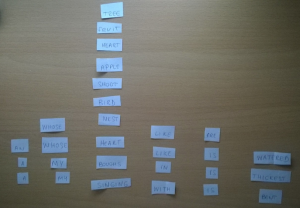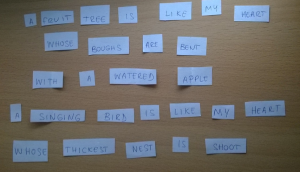It is especially remarkable the love-hate relationship that some students have with poetry. That is, in general terms, we like to talk about feelings and emotions, and it is great to read about this in literary texts such as poems. However, it is not so good for some of us to study these compositions. From my own experience, during my whole academic life, poetry has been really problematic to me, because I did not used to feel comfortable working on activities that were in relation with this topic. In any case, I suppose that some of you feel identified with these thoughts.
As a consequence of the previous ideas, if we bear in mind the didactic implications of this conception, some of us have a lack of confidence in teaching poetry. Because of these reasons, lessons such as the one that we had in the subject Children’s Literature in English, can be quite useful to improve our literature didactic skills. During the first part of the lesson, we knew some interesting and useful websites to introduce poetry to our future students. And we prepared a poem performance in groups. It was a fantastic approach to know more about teaching and learning poetry.
From then on, I decided to make some research on the teaching of poetry and I found a source that could be useful for us:
The Poetry Trust, according to its official website, is “one of the UK’s flagship poetry organizations, delivering a year-round live and digital program, creative education opportunities, courses, prizes and publications”.
One of the most interesting publications of this organization is The Poetry Toolkit (foolproof recipes for teaching poetry in the classroom). It is a guide with lots of activities and didactic possibilities that can be applied in the classroom. Besides, this document reflects on how hard it can be for teachers and students to understand poetry. It also encourage teachers to try the proposed activities by themselves, before they use these ones in their work with students. The main aim is that teachers gain an idea of the nature of each task and its possibilities.
An interesting activity designed by Amanda Dalton is Poem Jigsaws (Choosing the right word). To develop this activity, we provide pairs of students with a poem that has been cut up into words that they have to put together again as they want. The aim of the activity is not based on reconstruct the original composition, but to create something new and original. Through this task we help our students to understand some features of poetry such as: word order, syntax and language.
Due to the fact that we, as future teachers, should try these activities, I prepared my own Poem Jigsaw using a sample of the poem A Birthday written by Christina G. Rosetti:
My heart is like a singing bird
Whose nest is in a watered shoot;
My heart is like an apple tree
Whose boughs are bent with thickest fruit;
In the described publication there are much more interesting activities that we can use with pupils. I recommend you to read this useful publication and to do other new activities. ![]()

